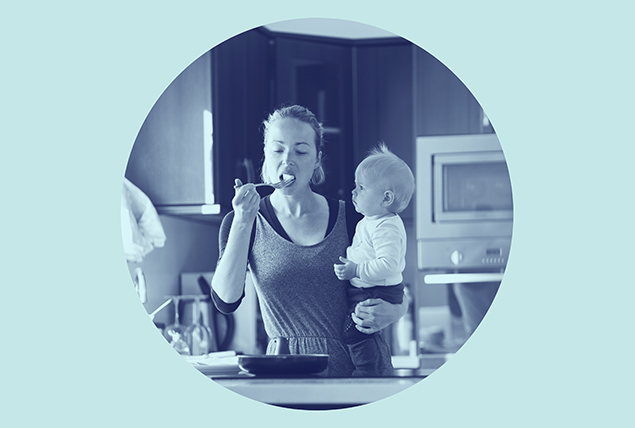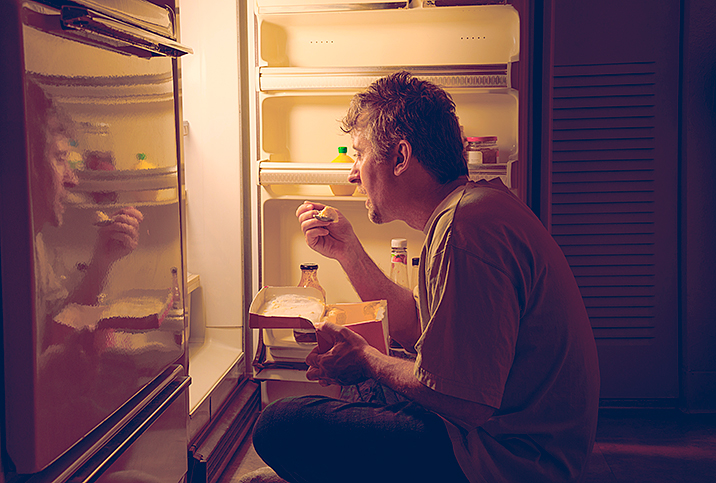Your Postpartum Eating Disorder Doesn't Have to Be A Silent Struggle

Key Points
- The stress of the postpartum period combined with the diet culture messaging on social media can lead to harmful behaviors.
- Women can experience birth trauma or unanticipated deliveries, leading to feelings of powerlessness and depression.
- Early detection and medical support are crucial for effective treatment and recovery.
Nursing her newborn son while casually scanning social media, Shannon Kopp stopped her scroll when she came across a post comparing Kylie Jenner's body before and after giving birth.
"There were pictures of her body pregnant and then postpartum. The headline said something like, 'Kylie's got her body back in just six weeks!' Had she lost her body pregnant? Of course not. Her body had changed and grown to bring new life into this world," Kopp said.
She recalled identifying at the moment how "harmful and destructive" the social media post (and the diet culture and fatphobia it perpetuates) could be for fellow new mothers.
"Postpartum is a stressful time, and with the overwhelming diet culture messaging on social media, one can begin to believe that if they restrict their food, they will restrict their stress," said Kopp, an author who currently serves as an Eating Recovery Center national recovery advocate in Denver. "If they 'lose the baby weight,' they will lose this feeling of being overwhelmed. For many, dieting is the beginning of their eating disorder."
There is the potential for societal beauty standards to lead to the development of eating disorders, particularly during the postpartum period, according to Mary Dobson, L.M.F.T., a licensed psychotherapist and certified eating disorder specialist who founded behavioral health group LIFT Wellness in Boca Raton, Florida.
Supportive family and friends can assist with early intervention, treatment compliance and child care so that mom can take time to prioritize her health.
"Societal and media pressures emphasize 'getting your body back' and 'bounding back into shape,' which are unattainable, impractical and generally unhealthful goals for most new moms," Dobson said. "Magazines feature celebrities who shed baby weight quickly, and inadequacy and shame are triggered for women who don't."
The postpartum period—the time following a birth typically lasting two years—is a particularly high-risk time to develop or experience a recurrence of an eating disorder, she said, due to the amount of intense biological, social and psychological changes accompanying this period.
"Many women experience birth trauma or a delivery that did not go as anticipated or planned," Dobson said. "And this realization can manifest in feelings of powerlessness, hopelessness and depression. Often, patients report that their bodies felt alien to them during pregnancy and they wish to quickly reclaim their sense of scale, scope and dimensions in physical space."
Recommended
- Can Eating Disorders Be Genetic?: Around 30 million Americans will have eating disorders in their lifetime. Are they inherited?
- Dating With an Eating Disorder: For couples, a mental health challenge can feel like an unwelcome third party.
- Safety First: The Most Risky Sex Positions: It's essential to recognize that some sex activities can be more dangerous than others.
Warning signs and symptoms of postpartum eating disorders
Eating disorders can affect anyone during the postpartum period.
People who are at the highest risk of developing postpartum eating disorders include people with preexisting body image dissatisfaction or distress, those with a history of eating disorders, and people who face mood disorders such as clinical depression, according to Kim Anderson, Ph.D., a licensed clinical psychologist and executive director of Maryland and Ohio's Pathlight Mood and Anxiety Center.
Symptoms of postpartum eating disorders vary but are usually accompanied by feelings and thoughts of discomfort and distress, she said, and can include the following:
- Binge eating. This is where you eat a large amount of food in a short period of time.
- Exercising. Especially after eating, you feel a compulsion to exercise excessively.
- Purging. After eating, food will be purged through self-induced vomiting.
- Restrictive eating. You eliminate certain types of food or food groups from your diet, count your calories or simply reduce the volume of food consumed.
"For most eating disorders, there's a strong component of body image concern, a distress associated with feeling uncomfortable with your body, a fear of weight gain or wanting to 'fix' your body in some way," Anderson said.
Kopp spoke from personal experience when she outlined the emotional impact that can accompany physical symptoms of a postpartum eating disorder.
"The early signs of my eating disorder included being preoccupied with food and my weight, as well as bingeing and compensatory behaviors," she said. "I felt depressed and deeply ashamed, as though the eating disorder was my fault. Even though I understood on an intellectual level that an eating disorder is never a choice or vanity issue but instead a complex and serious mental disorder, I somehow thought I should've been able to prevent it or heal on my own.
"The shame I experienced caused me to isolate from my support systems, which made it even more difficult to recover."
Treating postpartum eating disorders
It's the complex, multifaceted impact on your quality of life that makes early detection and medical support key ingredients to the treatment and recovery of postpartum eating disorders.
"It's very important that all healthcare professionals, obstetricians and midwives, for example, screen for eating disorders and make referrals when appropriate," Anderson said. "It's also very important for moms to tell their healthcare professionals about past or present eating disorders or body image concerns."
If not detected and treated, postpartum eating disorders can carry health risks for both the mother and the baby. She listed four risks associated with eating disorders during the postpartum period:
- Complications in recovery from pregnancy and delivery
- Depression and anxiety
- Difficulties breastfeeding
- Malnutrition
"In some cases, these factors—along with the eating disorder symptoms—can negatively impact the bonding between a mother and her infant," Anderson said. "For some mothers, they may not have sufficient energy available to devote to the care of the infant, making it more difficult to connect and attach."
A Closer Look at What's Behind Eating Disorders: Eating disorders harm both physical and psychological health and are life-threatening if left untreated. It is important to recognize that eating disorders are not a choice. They don't develop suddenly or disappear overnight. Food is not the root of the problem; it's the coping mechanism.
Treatment for postpartum eating disorders depends on the severity of symptoms and the presence of depression, anxiety or OCD, mental health conditions frequently linked to eating disorders, Anderson said.
"Eating disorders are complex problems, so we're targeting psychological, medical and nutritional interventions," she added. "In every case, because of the physical complications of eating disorders, a complete medical evaluation is the first thing that you do.
"In some cases, treatment could look like as few as 20 sessions of outpatient cognitive behavioral therapy treatment if it's mild, a new onset and you catch it early. If somebody has a severe problem, it could require hospitalization, residential treatment or other higher levels of care."
Community support is a critical ingredient
With all of the responsibilities of being a new mom, reaching out for help is critical to achieving long-lasting recovery from a postpartum eating disorder. Dobson advised partners, family members and friends of people experiencing postpartum eating disorders to offer whatever support they can.
"Supportive and eating disorder-informed partners, family members and friends can assist with early intervention, treatment compliance and child care so that mom can take time to prioritize her health," Dobson said. "Whenever possible, make an offer to watch the baby or drive to the appointment. Always validate mom that they're not alone."
Kopp, who wrote "Pound for Pound: A Story of One Woman's Recovery and the Shelter Dogs Who Loved Her Back to Life" about the humane aid she received while battling bulimia, said the necessity of support systems while experiencing a postpartum eating disorder cannot be overstated.
"Volunteering at my local humane society and spending time with animals became a motivating factor for my recovery," she said. "I wanted to live because I knew these animals needed me and loved me exactly as I was. They didn't see me as a person living with an eating disorder or depression. They saw me as someone worth loving, even in my darkest moments. The way they saw me eventually helped me to look at myself through a more compassionate lens.
"Eating disorders isolate individuals from their support. If you're struggling with a postpartum eating disorder, please attend a free support group. These groups can be life-changing."


















